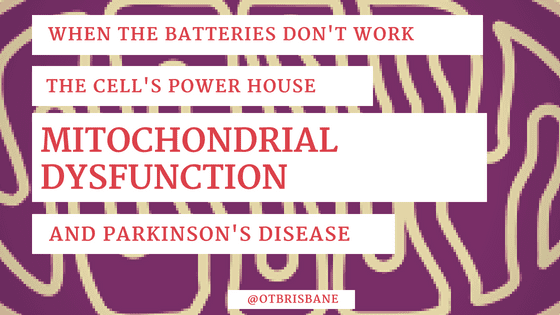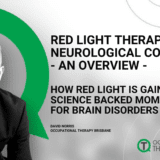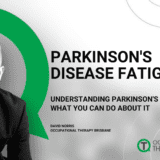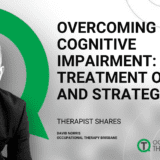The Mitochondrial Dysfunction Connection and Parkinson’s Disease
Parkinson’s disease is a progressive neurological condition which affects an estimated 10 million individuals worldwide and neuroscientists are discovering more about Mitochondrial Dysfunction Connection and Parkinson’s Disease
It’s clear there’s great diversity in a person’s Parkinson’s disease symptoms as described elsewhere in this blog. A person may experience symptoms of diminished ability to control one’s movements, a sense of weakness, tightening of muscles or dystonia, light-headedness or postural hypo-tension, changes in sense of smell, restlessness as well as cognitive changes such as short term memory loss.
Parkinson’s disease takes a physical, emotional, and psychological toll on patients and their loved ones. But researchers are getting closer to uncovering what exactly may be the root cause of this chronic condition.
Interested To learn 13 Brain Health Principles for Parkinson’s Disease? Take a look at this Free report, HERE
What Are Mitochondria?
They serve as the cells batteries, “the energy factory” powering various functions of the cell and the organism as a whole.
Interesting Fact: Clearly they are a critical part of the cell, it appears that wasn’t always the case as they are believed to have evolved from primitive bacteria.
In each cell, there are special units of “organelles” with specific functions. They each have a special role to play in te cell in order for it to operate smoothly. The main function of mitochondria is to metabolize or break down carbohydrates and fatty acids in order to generate energy.
So in a way, the mitochondria in our brain essentially act as a power source for our cells, including the cells that are responsible for producing the chemical dopamine (a neurotransmitter or messenger agent in the body and brain).
A Mitochondrial Dysfunction Affecting Brain Cells
Mitochondrial diseases are chronic, genetic, often inherited disorders that occur when mitochondria fail to produce enough energy for the body to function properly (Cleveland Clinic).
Mitochondria are deeply dynamic and complex organelles that constantly divide and fuse with each other, move along the cell, suffer regulated turnover and play diverse important cellular functions. It has been observed that abnormalities in this balance can lead to neuron dysfunction and cell death. (Villace et al, 2017).
Mitochondrial Dysfunction Connection and Parkinson’s Disease
Neurons are especially energy-dependent cells and in the case of dopaminergic neurons, this dependence is even higher. Neurons are extremely sensitive to mitochondrial injury which can have drastic consequences for neuron health and survival.
Mutations to mitochondria directly affect a cell’s ability to make dopamine.
Damaged mitochondria can negatively influence neurons – including those that produce dopamine – in many ways.
- They can produce too much free radicals which can damage cells;
- They can affect the management of calcium inside and outside the cells which impacts neuronal health directly;
- They can create problems how nerve cells communicate with each other;
- They can contribute to the death of cell cell death.
These symptoms in the end can cause the dopamine-producing neurons to malfunction or die.
For those with Parkinson’s disease, the cells responsible for creating dopamine start to die in an area of the brain known as the substantia nigra. When these levels drop, individuals may present with the cardinal signs of Parkinson’s disease.
How You May Support Your Mitochondria
Our mitochondria fuel our bodies at their most basic level. Properly taking care of these little powerhouses means not only keeping the disease at bay but improving our entire health.
Not a lot is known about mitochondria and how to repair them when damaged. But research over the past decade has shown some promising links between certain nutrients in our diet and improving mitochondria function, including:
- Antioxidants
Interested in boosting your antioxidant levels? Look towards organic berries like blueberries and strawberries. Fresh or frozen, one cup of these berries will give your antioxidant levels a good boost.
Other foods rich in antioxidants include green tea (because of their high levels of catechins), pecans (rich in vitamin E), and carrots (loaded with beta-carotene).
- Coenzyme Q10 (CoQ10)
CoQ10 can be taken as a supplement, though it is possible to increase your levels with certain foods. Fatty cold-water fish like tuna, salmon, and herring are great options, and beef and chicken boast some of the highest levels of this nutrient (they also contain acetyl-l-carnitine, another much-needed nutrient for mitochondria support).
Not a fan of beef or fish? Start snacking on peanuts and sesame seeds. Certain fruits and vegetables like oranges, broccoli, cauliflower, and strawberries also contain high levels of this nutrient.
- Lutein and Zeaxanthin
Eggs and dark leafy greens like kale, spinach and chard are all great sources of both lutein and zeaxanthin. Other foods like oranges and corn also contain high amounts of both nutrients.
Research into dietary repair of damaged mitochondria is very much in it’s early years. As yet there is little known how supplements and diets studied in the lab, especially in mice, will affect drug interactions and disease processes. Much more is needed to be known. It is likely the best course of action may be to follow a healthy nutritional program such as the Mediterranean diet or the MIND diet. We have an extensive blog on the MIND diet and you can find it HERE.
Learn More About Your Treatment Options with Occupational Therapy Brisbane
The Occupational Therapy Brisbane team take a holistic approach when providing tailored treatment plans to our Parkinson’s disease clients. As well as striving to provide patients with the most independent and safe lifestyle possible, we work with our clients to help uncover issues which may be having an impact on their treatment outcomes. Our goal is to help you achieve maximum functional independence and to sustain this for as long as possible.
For more information on our services and how we can help you or your loved one, we welcome you to take a few minutes to fill out the contact form, or call 1300 783 200 to schedule a time to speak with a Brisbane occupational therapists.
References and Sources
- Villace et al (2017): Mitochondria in the context of Parkinson’s disease.
https://www.ncbi.nlm.nih.gov/pmc/articles/PMC5361502/ - Recognizing the Importance Parkinson’s Awareness Month
http://mitochondrialdiseases.org/parkinsons-awareness-month/ - Mitochondrial dysfunction in Parkinson’s disease: molecular mechanisms and pathophysiological consequences. https://www.ncbi.nlm.nih.gov/pubmed/22735187
- The Cleveland Clinic: https://my.clevelandclinic.org/health/diseases/15612-mitochondrial-diseases
- What Are Mitochondria? https://www.livescience.com/50679-mitochondria.html










